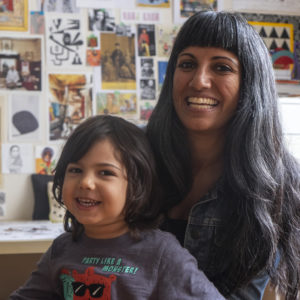
Alumni uses her artistic platform to address femicide
Sandeep Johal uses the memory of her mother's Indian clothing to offer compassionate portraits of women who have been victims of gender abuse
Reported by Kirsten Clarke

Sandeep Johal recalls the gifting of ladoos, a round yellow Indian dessert delivered when boys are born, and asked her mother why girls weren’t similarly celebrated.
“I think from that point on I started noticing the inequity more and more, and I became more interested in gender justice,” she said.
History
Johal is a first-generation Canadian artist, who grew up in a South Asian household and strives to draw attention to issues of gender-based violence.
She didn’t formally start her art career until after she was on maternity leave with her son, Safa, now three. Her passion for raising awareness for violence against women began when she was a child.
At 30, Johal accomplished a long-time goal of entering the fine arts department. She carried her desire to celebrate women to Langara.
Gordon Trick, a former teacher of Johal’s, kept up with her work since her graduation in 2007.
In Trick’s class, Johal chose to address the honour killings of South Asian women in the Lower Mainland, a subject that was personal to her. These images laid the foundation for Johal’s first solo show in 2017, “Rest in Power,” nearly a decade later.
Johal’s art
Johal’s images are colourful and intricate – she is a self-described maximalist. She uses memories of her mother’s brightly embroidered Indian clothing to offer compassionate portraits of women who have been victims of gender abuse and violence.
“I want to cram as much stuff as I can into a piece but still make it harmonious to look at,” she said.
Helena Wadsley, Langara’s fine arts instructor, believes that art can make people think and see things differently. Both Wadsley and Trick believe that it is vital for an artist to have a personal connection to the subject matter if they want their art to function as activism.
“The more personal it is, the more it can hit that kind of empathy in the viewer,” said Wadsley.
Johal says that she wants to tell the stories of those who can no longer speak for themselves, to keep their memories alive. “Hopefully, by sharing all these stories of these women, something will change, and if my art can be just a small part of that change then I feel that I’ve done my job as an artist.”



Comments are closed.